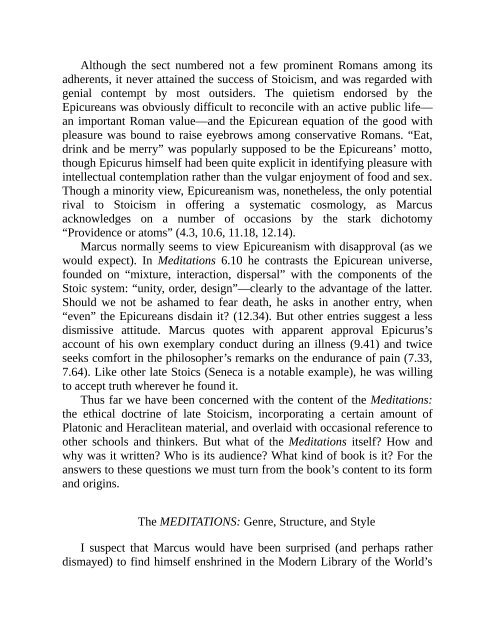9781945186240
Create successful ePaper yourself
Turn your PDF publications into a flip-book with our unique Google optimized e-Paper software.
Although the sect numbered not a few prominent Romans among its<br />
adherents, it never attained the success of Stoicism, and was regarded with<br />
genial contempt by most outsiders. The quietism endorsed by the<br />
Epicureans was obviously difficult to reconcile with an active public life—<br />
an important Roman value—and the Epicurean equation of the good with<br />
pleasure was bound to raise eyebrows among conservative Romans. “Eat,<br />
drink and be merry” was popularly supposed to be the Epicureans’ motto,<br />
though Epicurus himself had been quite explicit in identifying pleasure with<br />
intellectual contemplation rather than the vulgar enjoyment of food and sex.<br />
Though a minority view, Epicureanism was, nonetheless, the only potential<br />
rival to Stoicism in offering a systematic cosmology, as Marcus<br />
acknowledges on a number of occasions by the stark dichotomy<br />
“Providence or atoms” (4.3, 10.6, 11.18, 12.14).<br />
Marcus normally seems to view Epicureanism with disapproval (as we<br />
would expect). In Meditations 6.10 he contrasts the Epicurean universe,<br />
founded on “mixture, interaction, dispersal” with the components of the<br />
Stoic system: “unity, order, design”—clearly to the advantage of the latter.<br />
Should we not be ashamed to fear death, he asks in another entry, when<br />
“even” the Epicureans disdain it? (12.34). But other entries suggest a less<br />
dismissive attitude. Marcus quotes with apparent approval Epicurus’s<br />
account of his own exemplary conduct during an illness (9.41) and twice<br />
seeks comfort in the philosopher’s remarks on the endurance of pain (7.33,<br />
7.64). Like other late Stoics (Seneca is a notable example), he was willing<br />
to accept truth wherever he found it.<br />
Thus far we have been concerned with the content of the Meditations::<br />
the ethical doctrine of late Stoicism, incorporating a certain amount of<br />
Platonic and Heraclitean material, and overlaid with occasional reference to<br />
other schools and thinkers. But what of the Meditations itself? How and<br />
why was it written? Who is its audience? What kind of book is it? For the<br />
answers to these questions we must turn from the book’s content to its form<br />
and origins.<br />
The MEDITATIONS:: Genre, Structure, and Style<br />
I suspect that Marcus would have been surprised (and perhaps rather<br />
dismayed) to find himself enshrined in the Modern Library of the World’s


